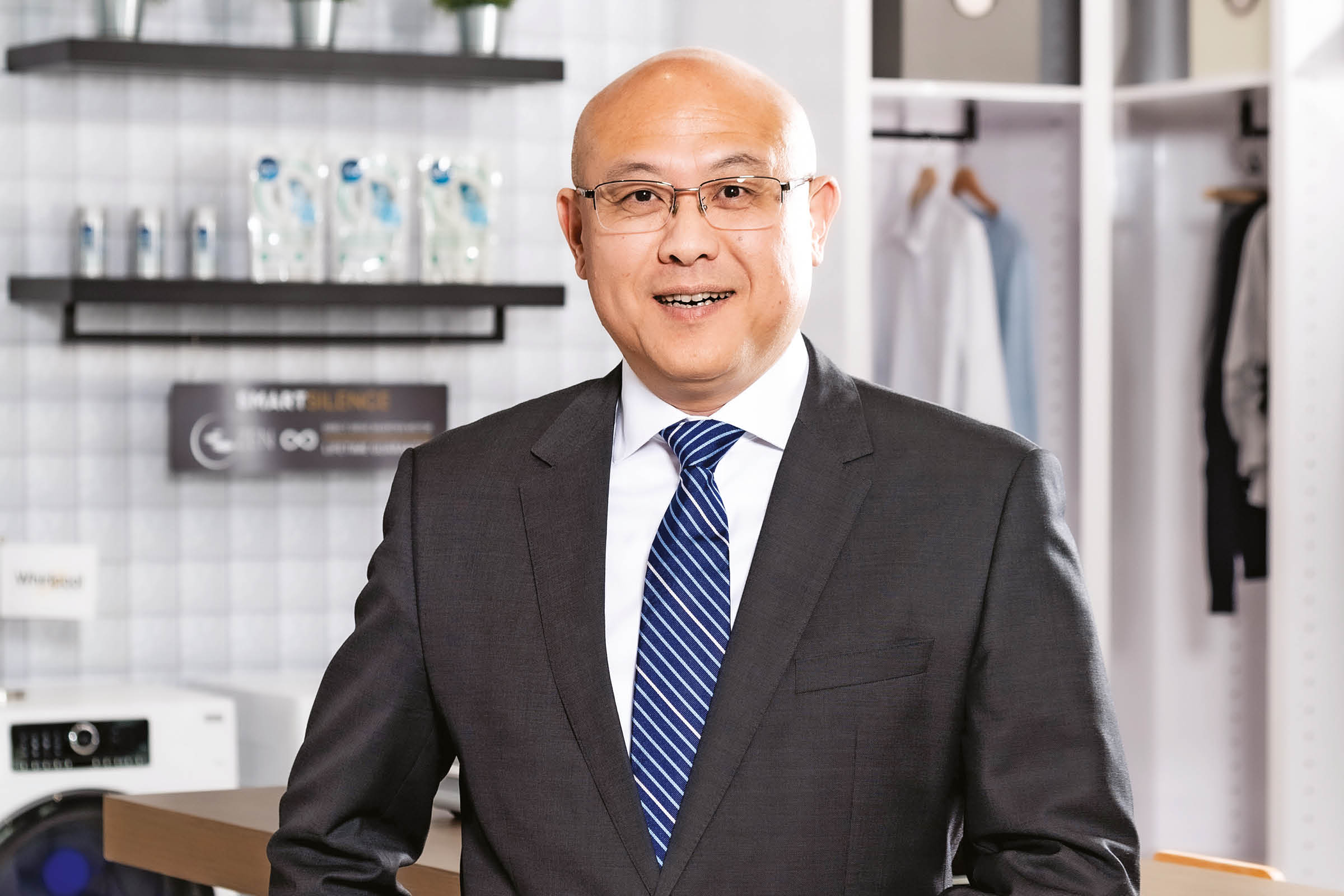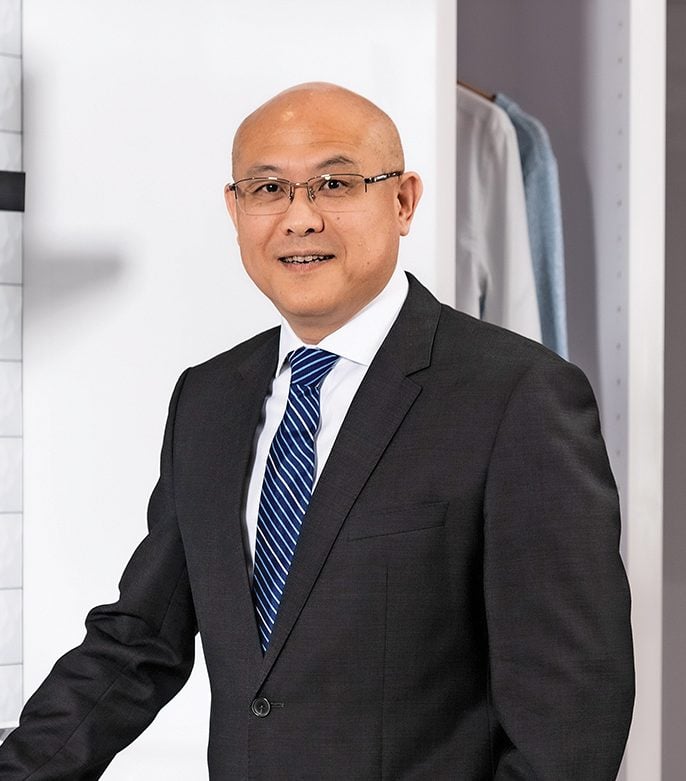Yin and Yang: Samuel Wu
It’s been a tumultuous few years, but Whirlpool Corporation’s President Asia–Pacific, Samuel Wu, is very optimistic about the company’s future in this part of the world.
Since the pandemic began, Sam Wu has accumulated more than 100 days in quarantine due to essential work-related travel. Weekends were the hardest, he reveals. But on weekdays, he was able to spend his days videoconferencing and generally being highly productive on the work front.

As the Hong Kong-based President of Whirlpool’s Asia–Pacific markets, staying on top of each of his markets is critical, Sam tells The CEO Magazine. The region is incredibly varied, ranging from mature markets such as Hong Kong and Australia to those with immense and largely untapped potential such as India and Vietnam.
COVID-19 itself has had an immense impact on the business. In China, sales of Whirlpool’s washing machines featuring Smart Ozone technology – the first in that market upon launch – skyrocketed.
"You can also do a dry wash so you can wash your shoes, your mobile phone, your expensive handbag, and the washing machine basically sanitises it for you using ozone," Sam explains. "A 60–70°C wash does not guarantee that you will kill the germs and viruses."
The feature initially proved particularly popular with parents in China eager to keep their children’s toys clean. Then, nine months after the feature was first introduced, the pandemic struck, creating even more demand for the technology, which was seen as capable of killing the germs associated with the virus.

"That is one of the reasons that Whirlpool is the only multinational brand really growing in China," Sam says, adding that the growing predominance of national brands has made the market increasingly difficult for international competitors.
Over in Australia, Whirlpool experienced a surge in demand for small kitchen appliances like coffee machines and toasters as people spent more time at home during lockdown. "We saw the same thing in Singapore and Hong Kong," Sam reveals.
"We are more than happy that we were able to help our customers through these difficult times." To ensure Whirlpool could continue to serve its customers during the pandemic, the company sourced enough personal protective equipment for its service technicians. "During the pandemic’s early days, finding PPE was a huge task," he recalls.
Sam leveraged the company’s global network to source masks from Europe and the US, where the pandemic had not yet struck. "I gave them to our technicians so they could still go to consumers’ homes and service their machines, which earned customer loyalty," he says.
On top of these effects, the pandemic has also resulted in supply constraints, a rise in material costs and transportation issues. However, overall, Sam says he is "more than happy" with the company’s performance over the past 18–24 months. The pandemic is not the only challenge the company is up against.
There’s no other market in the world that presents such an opportunity so that is why I’m focusing on India to secure Whirlpool’s presence there.
"One thing that is guaranteed in the appliances industry is that you can’t stand still – the competition is intense," Sam stresses. "We did well by launching the first ozone-enabled washing machine and UV-enabled refrigerators, but competitors are catching up – maybe give them six to nine months and they will come up with something similar."
Whirlpool must therefore remain "agile", Sam says. "You can’t take your eye off the business, even for one single week. Even on Christmas Day, I am still checking my emails."
Sam attributes Whirlpool’s success over its 110- year history to its focus on three key principles: brand leadership, product leadership and operational excellence. But even the way it looks at these three pillars needs to evolve to cater to a changing world. For example, once upon a time, word of mouth was a major marketing tool.
"We have so many consumers that tell me, ‘The reason I buy your brand is because my grandmother used it and then my mother used it. Everybody has been so happy with it that I have no reason to change brands,’" he recounts.
But now, with the younger generations all avidly using social media, they are looking at brands from a different perspective. Sam references a video he has seen, where someone places a glass of wine on top of a washing machine, and the spin cycle is so smooth that not a drop of the drink spills.
You can also do a dry wash so you can wash your shoes, your mobile phone, your expensive handbag, and the washing machine basically sanitises it for you using ozone.
"Brand is something that we need to continue to invest in and develop," he admits. "A 100-year history gives you the reason to trust us, but we need to keep refreshing the brand to be active, cool and social media-friendly so that the younger generation also embraces our name."
Looking to the future, Sam highlights the opportunities in developing markets like India and Vietnam as immense. While the European and US markets are all about "how to protect your consumer", Asia is more to do with the "new customer".
"Appliance penetration in India is only around 30%, which means that 70% of families there still do not have a washing machine. But that will change as the economy creates a growing middle class with disposable income," he says.
"There’s no other market in the world that presents such an opportunity so that is why I’m focusing on India to secure Whirlpool’s presence there." This strategy of prioritising specific markets is an essential part of gaining cut-through in such a large region, according to Sam.
"If I peanut butter spread all my investments and resources, I will go nowhere," he points out. By working out which markets require an "aggressive" approach and which are more "defensive", you can effectively allocate resources to ensure success. Other markets, yet to come to fruition, require an approach that Sam calls "seed planting".
"You have to plant your seed in advance in certain locations," he explains. "Otherwise, you will never enjoy its fruits." Almost in line with this localised approach, the company will also be undertaking a process of diversification to help it cope with the torrent of geopolitical changes that have been exacerbated by the pandemic, Sam says.
That means reviewing the business to see where it is overly reliant on a single supplier or customer channel. Sam believes a rebalancing is taking place, something which he compares to the "yin and yang" concept of dualism drawn from ancient Chinese philosophy. Companies that were so focused on globalisation for so many years are now having to rethink their strategies.
"Globalisation brought a lot of benefits to the industry, to the world economy and to individual shareholders, but on the other hand, given all the political disruptions of late, it has become clear that today’s world is very different to that of just a few years ago," Sam reflects.
"It is all about balance. You can’t overly emphasise one side without focusing on the other. So my prediction is – regardless of the industry, regardless of the country – that over the next 10 years, we will be rebalancing."
Proudly supported by: